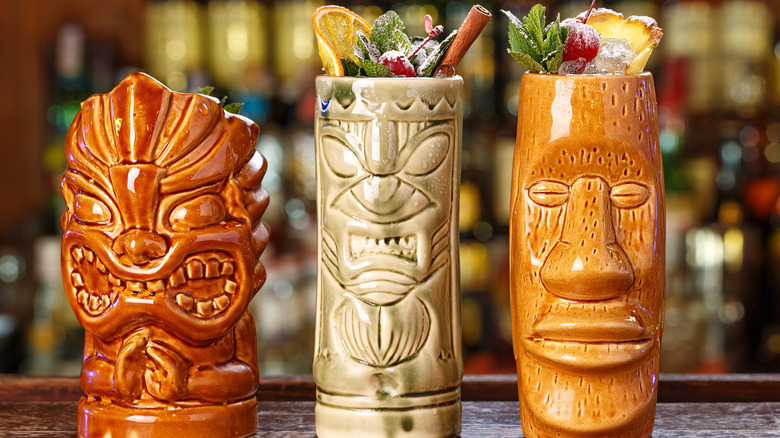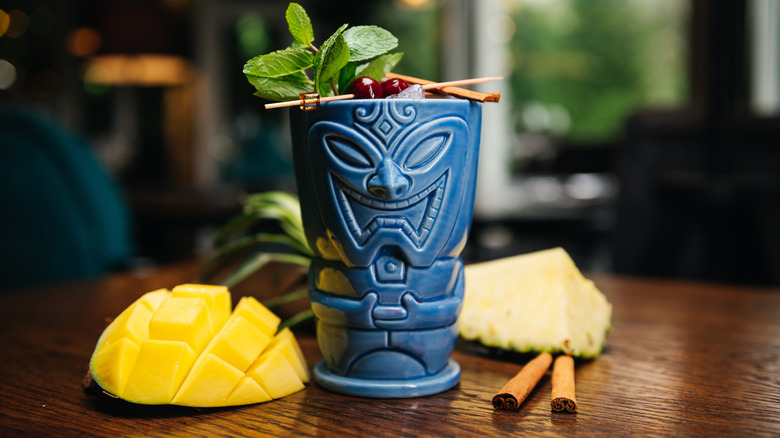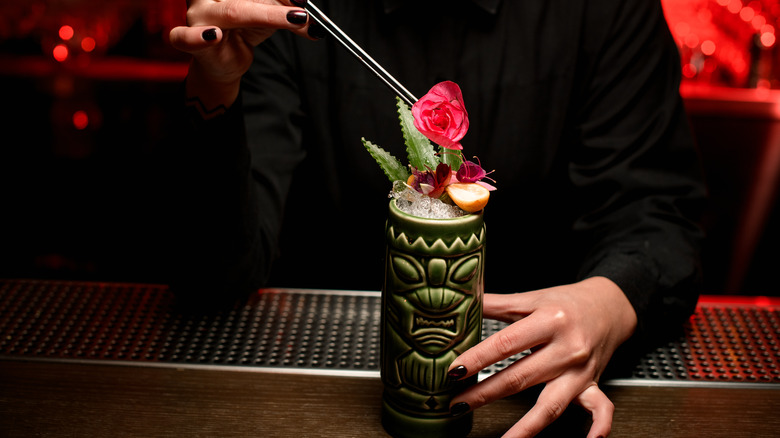Here's Who Was Responsible For The Very First Tiki Bar In America
Tiki bars have long represented escapism to an island paradise without having to leave the comfort of one's town. Tiki culture, with its colorful decorations and Caribbean rum cocktails in cocktail glasses featuring Polynesian art, became prevalent in American culture in the mid-20th century. However, the history of tiki bars and their ties to American colonialism, as well as cultural appropriation of Polynesian and Māori culture, have made them controversial institutions.
The history of tiki bars in America predates Hawaii joining the United States, with the first tiki bar of its kind dating back to the early 1900s. Ernest Raymond Gantt, or Donn Beach (as he would later change his name to), is credited with introducing the concept. Born in New Orleans, Beach spent much of the early 1900s bouncing around the Caribbean and the Pacific islands, working at one point as a beachcomber in Tahiti. In part to avoid the Prohibition back home, Beach's travels gave him a new appreciation for Caribbean rums. He also started collecting cultural artifacts, which he would later use to decorate his tiki bars.
Tiki art originates from Māori culture on the Marquesas Islands and spread to most Polynesian islands, with the most famous representations being the massive moai heads of Easter Island. Polynesian islanders carved symbols of tiki on trees and other materials to represent half-man, half-god mythical creatures who created the first human beings. Beach relied on these motifs to help sell the allure of the islands to landlocked Americans. He opened the first tiki bar in Hollywood in 1933.
The rise and fall of tiki bars in America
Donn Beach decorated his tiki bar to offer a taste of an island escape, adorning the establishment with cultural artifacts he collected during his travels. As would become the norm, rum was the focus of Beach's tiki bar. Revolutionizing the world of cocktails in more ways than one, Beach became known for his complex drinks, combining fruits and different types of rum, the chief among them being the Zombie. These were a far cry from the syrupy cocktails of the tiki bars in the 1980s. However, Beach's drinks were still inauthentic to Polynesian culture, as islanders didn't drink the kinds of cocktails Beach pushed, per tiki historian Jeff Berry in Eater.
The concept of tiki bars proved to be successful, with Beach's competitor Victor Bergeron finding widespread success with his tiki franchise Trader Vic's and its famous mai tai cocktail. As for Beach, he later returned home after World War II to find that his first wife had franchised his bar without his permission. Beach later moved to Hawaii to pursue other ventures, but the reign of tiki was in full effect across the continental United States.
However, the counterculture of the late 60's caused tiki bars to fall out of favor. This younger generation viewed tiki bars as tacky and inauthentic, and the issue of cultural appropriation became apparent. The Polynesian culture, and its gods and mythology, had been marketed and sold as island bliss and escapism. However, according to Beach's second wife, his passion for tiki bars came out of a profound appreciation for the Southern Pacific cultures, per Difford's Guide.
Resurgence of tiki bars and cultural appropriation
The decline may have started in the late 60s, but the 80s hastened their fall from grace across the country. Tiki historian Berry told Eater that cocktails in general took a backslide during this era, but tiki bars in particular took a hit, with the public consensus being that they served overly sugary, syrupy drinks that no one wanted. However, new adopters of tiki drink culture picked up an appreciation for tiki bars in the 1990s. Likewise, shows like "Mad Men" in the 2000s, which takes place in the time period when tiki bars were a fad, made new fans out of viewers.
These new adopters developed a nostalgia for these establishments, viewing them as colorful relics of their parents' past. They quickly pointed out that tiki culture shouldn't be and isn't representative of actual Polynesian culture. New fans of the aesthetic argue that tiki bars are supposed to represent a uniquely American experience of Pacific Islander culture without parodying it.
However, critics point out that tiki culture was created from experiences that took place in the context of colonialism and American militarism in the Southern Pacific, and that the fad erases the issues many Pacific Islanders are still dealing with from the history of colonization. Stephanie Nohelani Teves, a native Hawaiian and associate professor at the University of Oregon, told the LA Times, "The nostalgia people express through tiki is offensive because it forgets that this colonialism and militarism is ongoing, not temporary. Not past. Not over."


